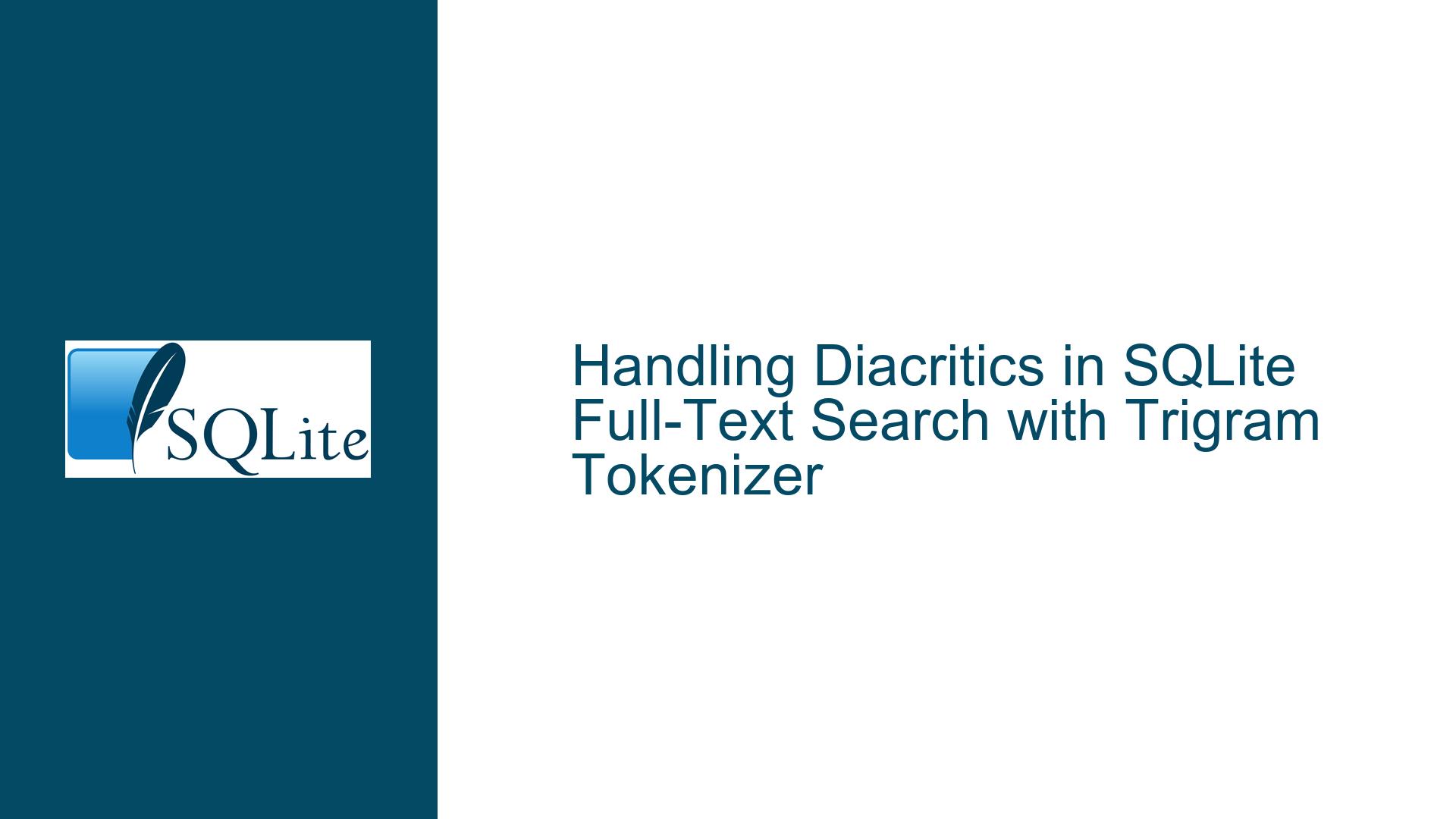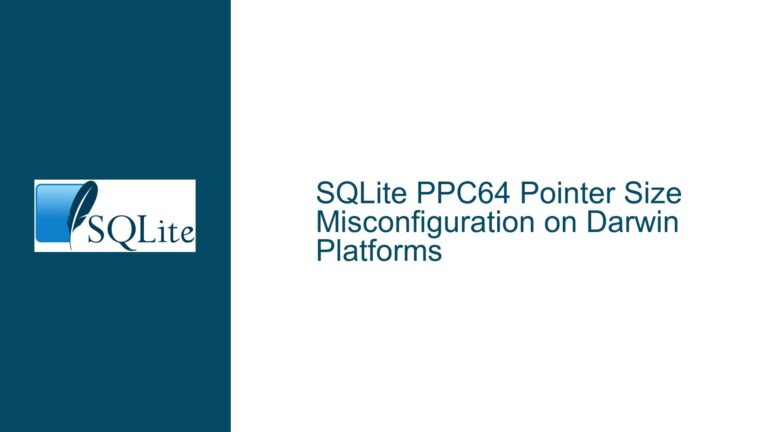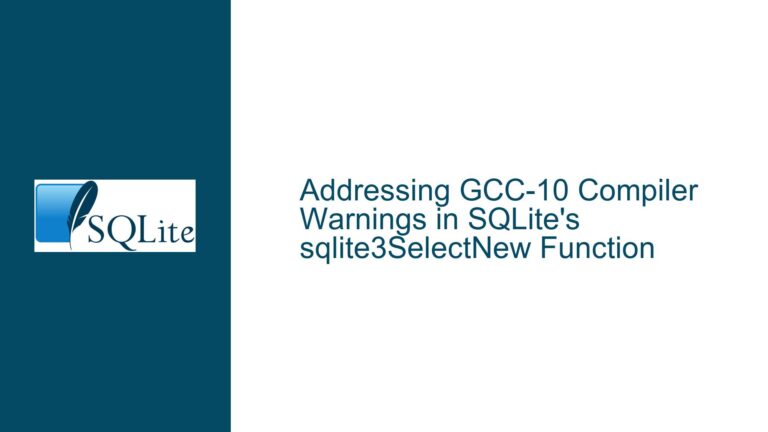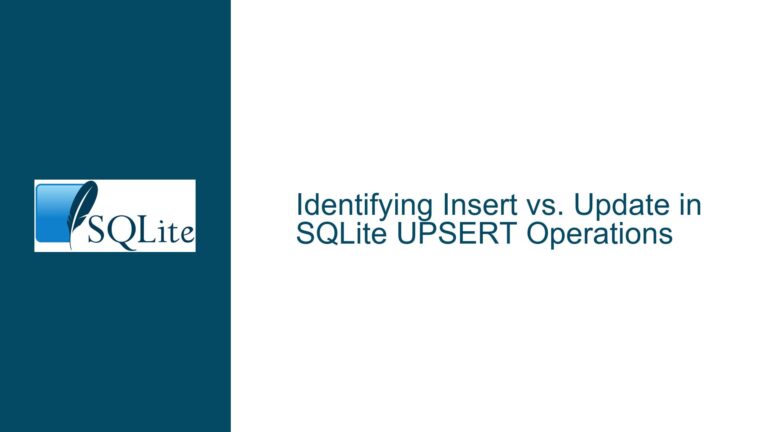Handling Diacritics in SQLite Full-Text Search with Trigram Tokenizer
Understanding the Diacritic Removal Challenge in Trigram Tokenizer
The core issue revolves around the handling of diacritics in SQLite’s full-text search (FTS) when using the trigram tokenizer. Diacritics are accent marks or other glyphs added to letters, which can significantly affect text search operations. For instance, a user searching for the term "double" might also want to retrieve results containing "doublé." However, the default behavior of the trigram tokenizer in SQLite does not normalize diacritics, leading to potential mismatches in search results.
The challenge is twofold: first, to ensure that the search functionality correctly matches terms with and without diacritics, and second, to maintain the integrity of the highlighter functionality, which is used to visually indicate the matched terms in the search results. The highlighter relies on the tokenizer’s output to accurately pinpoint the locations of the matched terms in the text. Any modification to the tokenizer’s behavior, such as diacritic removal, must be carefully implemented to avoid breaking the highlighter.
The initial attempt to address this issue involved modifying the sqlite3Fts5UnicodeFold function calls within the fts5TriTokenize function. By changing the folding mode from 0 to 2, the tokenizer was able to normalize diacritics, allowing for correct matching of terms with and without diacritics. However, this modification inadvertently broke the highlighter, causing it to incorrectly split accented characters at the end of tokens, resulting in malformed output.
A subsequent attempt introduced a conditional check to apply diacritic normalization only when the tokenizer is not in auxiliary mode (i.e., when it is not processing tokens for the highlighter). This approach successfully resolved the highlighter issue while maintaining the desired search functionality. However, it raised questions about the robustness of this solution and the potential for integrating such a feature into the core SQLite library.
Exploring the Causes of Highlighter Breakdown and Search Mismatches
The breakdown of the highlighter functionality when diacritics are removed can be attributed to the way the tokenizer processes and outputs tokens. The highlighter relies on the tokenizer to provide accurate byte offsets for the matched terms in the original text. When diacritics are normalized, the byte offsets of the tokens may shift, leading to incorrect highlighting. This is particularly problematic when the tokenizer splits an accented character at the end of a token, as the highlighter may attempt to highlight a partial character, resulting in malformed output.
The search mismatch issue arises from the fact that the default behavior of the trigram tokenizer does not normalize diacritics. As a result, a search for a term without diacritics (e.g., "double") will not match terms with diacritics (e.g., "doublé"). This limitation can be particularly problematic in multilingual or internationalized applications where diacritics are common. The initial modification to the sqlite3Fts5UnicodeFold function addressed this issue by normalizing diacritics, but it introduced a new problem with the highlighter.
The conditional approach, which applies diacritic normalization only when the tokenizer is not in auxiliary mode, attempts to strike a balance between search accuracy and highlighter integrity. However, this solution is not without its potential pitfalls. For instance, it may introduce inconsistencies in the tokenizer’s behavior depending on the context in which it is used. Additionally, it raises questions about the interaction with other tokenizer flags, such as the case_sensitive flag, which controls whether the tokenizer should consider case when matching terms.
Step-by-Step Troubleshooting and Solution Implementation
To address the diacritic removal challenge in SQLite’s full-text search with the trigram tokenizer, follow these detailed troubleshooting and solution implementation steps:
Step 1: Modify the sqlite3Fts5UnicodeFold Function Calls
The first step is to modify the sqlite3Fts5UnicodeFold function calls within the fts5TriTokenize function to normalize diacritics. This involves changing the folding mode from 0 to 2 in the function calls. This modification ensures that the tokenizer normalizes diacritics, allowing for correct matching of terms with and without diacritics.
sqlite3Fts5UnicodeFold(iCode, 2);
Step 2: Address the Highlighter Breakdown
The modification to the sqlite3Fts5UnicodeFold function calls may break the highlighter functionality. To address this, you need to modify the xToken line in the tokenizer to ensure that the byte offsets are correctly calculated when diacritics are normalized. The following change to the xToken line should resolve the highlighter issue:
rc = xToken(pCtx, 0, aBuf, zOut-aBuf, iStart, zIn - (const unsigned char*)pText);
This change ensures that the highlighter receives the correct byte offsets for the matched terms, even when diacritics are normalized.
Step 3: Implement Conditional Diacritic Normalization
To further refine the solution, implement conditional diacritic normalization by modifying the sqlite3Fts5UnicodeFold function calls to apply normalization only when the tokenizer is not in auxiliary mode. This approach ensures that the highlighter functionality remains intact while still allowing for diacritic normalization in search operations.
sqlite3Fts5UnicodeFold(iCode, flags & FTS5_TOKENIZE_AUX ? 0 : 2);
This conditional check ensures that diacritic normalization is applied only when the tokenizer is processing tokens for search operations, and not when it is processing tokens for the highlighter.
Step 4: Test the Solution
After implementing the above changes, thoroughly test the solution to ensure that it correctly handles diacritics in both search and highlighter operations. Perform the following tests:
- Search Test: Verify that a search for a term without diacritics (e.g., "double") correctly matches terms with diacritics (e.g., "doublé").
- Highlighter Test: Verify that the highlighter correctly highlights matched terms in the search results, even when diacritics are normalized.
- Edge Case Test: Test the solution with edge cases, such as terms with multiple diacritics or mixed-case terms, to ensure that the tokenizer behaves consistently.
Step 5: Evaluate the Robustness of the Solution
Evaluate the robustness of the solution by considering potential pitfalls and interactions with other tokenizer flags. For instance, consider how the solution interacts with the case_sensitive flag, which controls whether the tokenizer should consider case when matching terms. Ensure that the conditional diacritic normalization does not introduce inconsistencies in the tokenizer’s behavior.
Step 6: Propose Integration into Core SQLite
If the solution proves to be robust and effective, consider proposing its integration into the core SQLite library as a new flag for the trigram tokenizer. This flag could control whether diacritics should be normalized during tokenization, providing a more flexible and user-friendly solution for handling diacritics in full-text search.
Step 7: Document the Solution
Finally, document the solution in detail, including the modifications to the sqlite3Fts5UnicodeFold function calls, the conditional diacritic normalization, and the changes to the xToken line. Provide clear instructions for implementing the solution and include examples of how to use the new flag (if integrated into core SQLite) to control diacritic normalization.
By following these steps, you can effectively address the diacritic removal challenge in SQLite’s full-text search with the trigram tokenizer, ensuring accurate search results and maintaining the integrity of the highlighter functionality.






